"Now, then. Who can tell me why I had you run those twenty klicks in an hour yesterday?"
One recruit raised his hand. "Yes, Thompson?" Ruiz said. Either he had memorized the names of every platoon recruit, or he had his BrainPal on, providing him the information. I wouldn't hazard a guess as to which it was.
"Master Sergeant, you had us run because you hate each of us on an individual basis!"
"Excellent response, Thompson. However, you are only partially correct. I had you run twenty klicks in an hour because you can . Even the slowest of you finished the run two minutes under the cutoff time. That means that without training, without even a hint of real effort, every single one of you bastards can keep pace with Olympic gold medalists back on Earth.
"And do you know why that is? Do you? It's because none of you is human anymore . You're better . You just don't know it yet. Shit, you spent a week bouncing off the walls of a spaceship like little wind-up toys and you probably still don't understand what you're made of. Well, ladies and gentlemen, that is going to change. The first week of your training is all about making you believe. And you will believe. You're not going to have a choice ."
And then we ran 25 kilometers in our underwear.
Twenty-five-klick runs. Seven-second hundred-meter sprints. Six-foot vertical jumps. Leaping across ten-meter holes in the ground. Lifting two hundred kilos of free weights. Hundreds upon hundreds of sit-ups, chin-ups, push-ups. As Ruiz said, the hard part was not doing these things—the hard part was believing they could be done. Recruits were falling and failing at every step of the way for what's best described as a lack of nerve. Ruiz and his assistants would fall on these recruits and scare them into performing (and then have me do push-ups because I or my squad leaders clearly hadn't scared them enough).
Every recruit— every recruit—had his or her moment of doubt. Mine came on the fourth day, when the 63rd Platoon arrayed itself around the base swimming pool, each recruit holding a twenty-five-kilo sack of sand in his or her arms.
"What is the weak point of the human body?" Ruiz asked as he circled around our platoon. "It's not the heart, or the brain, or the feet, or anywhere you think it is. I'll tell you what it is. It's the blood, and that's bad news because your blood is everywhere in your body. It carries oxygen, but it also carries disease. When you're wounded, blood clots, but often not fast enough to keep you from dying of blood loss. Although when it comes down to it, what everyone really dies of is oxygen deprivation—from blood being unavailable because it's spewed out on the fucking ground where it doesn't do you a goddamned bit of good.
"The Colonial Defense Forces, in their divine wisdom, have given human blood the boot. It's been replaced by SmartBlood. SmartBlood is made up of billions of nano-sized 'bots that do everything that blood did but better. It's not organic, so it's not vulnerable to biological threats. It speaks to your BrainPal to clot in milliseconds—you could lose a fucking leg and you wouldn't bleed out. Most importantly to you right now, each 'cell' of Smart-Blood has four times the oxygen-carrying capacity of your natural red blood cells."
Ruiz stopped walking. "This is important to each of you right now because you're all about to jump into the pool with your sacks of sand. You will sink to the bottom. And you will stay there for no less than six minutes. Six minutes is enough to kill your average human, but each of you can stay down for that long and not lose a single brain cell. To give you incentive to stay down, the first of you that comes up gets latrine duty for a week. And if that recruit comes up before the six minutes are up, well, let's just say that each of you is going to develop a close-up and personal relationship with a shit hole somewhere on this base. Got it? Then in you go!"
We dove, and as promised, sank straight down to the bottom, three meters down. I began to freak out almost immediately. When I was a child, I fell into a covered pool, tore through the cover and spent several disoriented and terrified minutes trying to break through to the surface. It wasn't long enough for me to actually begin to drown; it was just long enough for me to develop a lifelong aversion to having my head completely enveloped by water. After about thirty seconds, I began to feel like I needed a big, fresh gulp of air. There was no way I was going to last a minute, much less six.
I felt a tug. I turned a little wildly, and saw that Alan, who had dived in next to me, had reached over. Through the murk, I could see him tap his head and then point to mine. At that second, Asshole notified me that Alan was asking for a link. I subvocalized acceptance. I heard an emotionless simulacrum of Alan's voice in my head.
Something wrong — Alan asked.
Phobia — I subvocalized.
Don't panic — Alan responded. Forget you're underwater —
Not fucking likely — I replied.
Then fake it — Alan responded. Check on your squads to see if anyone else is having trouble and help them —
The eerie calm of Alan's simulated voice helped. I opened a channel to my squad leaders to check on them and ordered them to do the same with their squads. Each of them had one or two recruits on the edge of panic and worked to talk them down. Next to me, I could see Alan make an accounting of our own squad.
Three minutes, then four. In Martin's group, one of the recruits began to thrash, jerking his body back and forth as the bag of sand in his hand acted as an anchor. Martin dropped his own bag and swam over to his recruit, grabbing him roughly by the shoulders, and then bringing his recruit's attention to his face. I tapped into Martin's BrainPal and heard him say — Focus on me on my eyes — to his recruit. It seemed to help; the recruit stopped his thrashing and began to relax.
Five minutes, and it was clear that extended oxygen supply or not, everyone was beginning to feel the pinch. People began shifting from one foot to the other, or hopping in place, or waving their bags. Over in a corner, I could see one recruit slamming her head into her sandbag. Part of me laughed; part of me thought about doing it myself.
Five minutes forty-three seconds, and one of the recruits in Mark's squad dropped his bag and began heading for the surface. Mark dropped his bag and silently lunged, snagging the recruit by the ankle and using his own weight to drag him back down. I was thinking Mark's second in command should probably help his squad leader with the recruit; a quick BrainPal check informed me that the recruit was his second in command.
Six minutes. Forty recruits dropped their bags and punched to the surface. Mark let go of his second in command's ankle and then pushed him from underneath to make sure he would break the surface first, and get the latrine duty he was willing to get for his whole platoon. I prepared to drop my sandbag when I caught Alan shaking his head.
Platoon leader — he sent. Should stick it out —
Blow me — I sent.
Sorry, not my type — he replied.
I made it through seven minutes and thirty-one seconds before I went up, convinced my lungs were going to explode. But I had made it through my moment of doubt. I believed. I was something more than human.
In the second week, we were introduced to our weapon.
"This is the CDF standard-issue MP-35 Infantry Rifle," Ruiz said, holding out his while ours sat where they had been placed, still within protective wrapping, in the parade-ground dirt at our feet. "The 'MP' stands for 'Multi-Purpose.' Depending on your need, it can create and fire on the fly six different projectiles or beams. These include rifle bullets and shot of both explosive and nonexplosive varieties, which can be fired semiautomatically or automatically, low-yield grenades, low-yield guided rockets, high-pressure flammable liquid, and microwave energy beams. This is possible through the use of high-density nano-robotic ammunition"—Ruiz held up a dully gleaming block of what appeared to be metal; a similar block was located next to the rifle at my feet—"that self-assembles immediately prior to firing. This allows for a weapon with maximum flexibility with minimum training, a fact that you sad lumps of ambulatory meat will no doubt appreciate.
Читать дальше
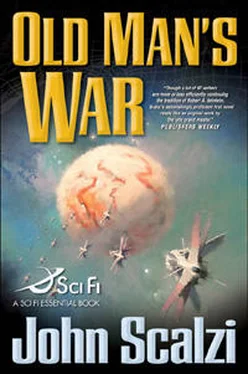
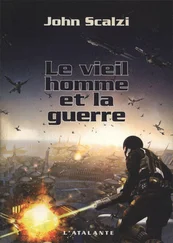

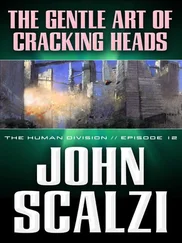
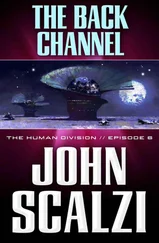
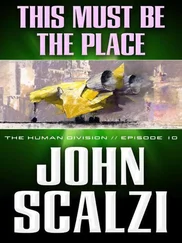




![Джон Скальци - Questions for a Soldier [Old Man's War 1.5]](/books/418139/dzhon-skalci-questions-for-a-soldier-old-man-s-wa-thumb.webp)
